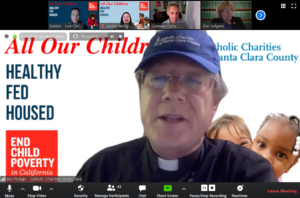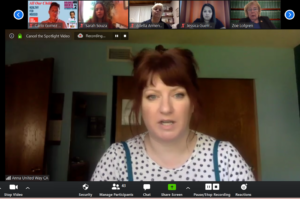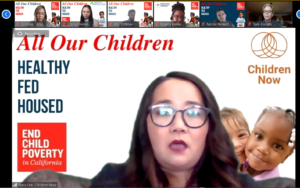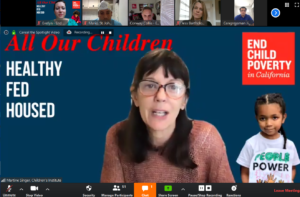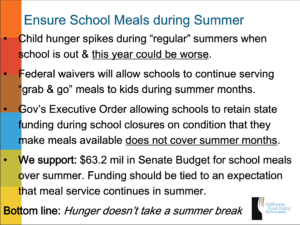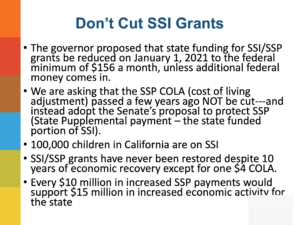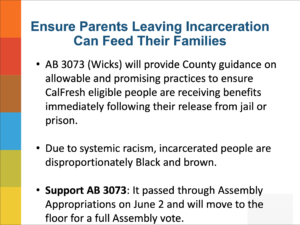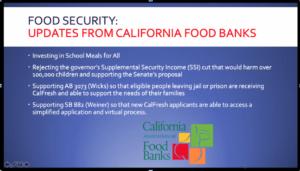Experiences During the COVID-19 Crisis
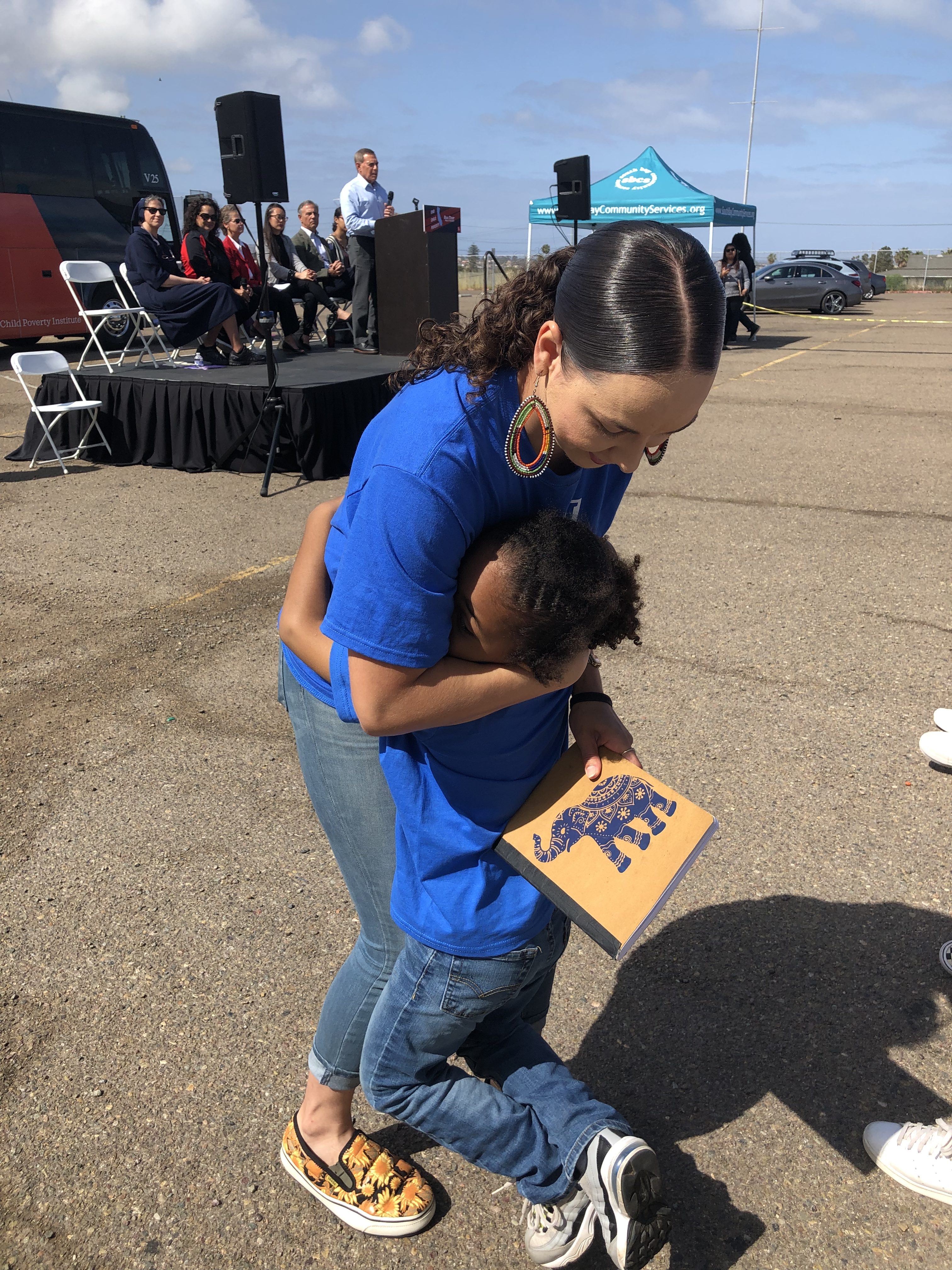
I am a Parent Advocate for Parent Voices San Diego as well as the San Diego Organizer for End Child Poverty California. I have a friend who is an undocumented immigrant with a 7-year-old-son. She already struggled to find work and now is struggling even more because of the virus. She’s cleaning houses and doing caregiving. She’s sacrificing her health and her family to afford this cost of living and not getting any emergency funding because of her status. We need to protect our most vulnerable communities and should never leave any families behind, especially during a pandemic that no one has control over. Another parent leader has a small child that needs an IEP. What about children with special needs? Another parent doesn’t have the funds for internet access to do work or school online. How can we assist our low-income communities in this time of need? We need food, shelter, healthcare, and the financial support for our most vulnerable families. We cannot expect they will overcome this pandemic without help from the government.

Being a mother of three is a challenge within itself, but to add on homeschooling for three different grades has set new heights I never set out for. Prior to this crisis I was working full time at an Amazon warehouse going to law school and studying for the baby bar. I already felt I had a lot on my plate. Having my kids in a good school that had longer hours like Kipp Academy 7:20 to 6:20 allowed me to juggle my everyday life. After COVID it seemed that things switched so quick it has been very hard to keep up. I’m now working at Amazon 60 hours a week as a social distance champion to inform associates how important it is to stay apart. I set the kids up in three time blocks – 10-12, 12-2, 2-4 – for them to do school. I do one video zoom with my law school class weekly from 5-6 on the way to work, then click in at 6:15pm and I’m there until 4:45am to come home and sleep and do it all again. This journey is very stressful not to say the least, but the quality time I’ve been able to have with my kiddos is priceless.
Having the family spread all over Fresno and me having a weakened immune system already, my whole family is on edge. I live alone, and my kids are spread through every other corner of Fresno. My grandkids are out of reach. None of them want to take the chance of infecting me so they stay away but my family is my life and so depression is setting in because I can’t have them to hold. I spent my birthday locked inside. My granddaughter’s third birthday is today and she’ll get no fanfare from Grandma or anyone today. When I video chat with her she reaches for me through the phone and it suffocates me to not be able to feel her hands. I can’t afford to go get any food because not only do I live check-to-check off of SSID – and that barely covers my bills – but I can’t afford to be exposed to anything by going to the store. My side jobs that I did to make extra money for cleaning supplies, birthday gifts… car maintenance, etc. I cannot do any more out of fear and risk of contagion. There’s plenty of places offering food bags and things but I can’t leave to go get them and unable to find one that delivers. I understand the reason for isolation but I don’t understand why it took so long for our government to start acting on this virus and why there isn’t more help for us…. No family, no food, no money, no certainty of any outcomes. It’s almost like I’m just sitting here waiting to die.
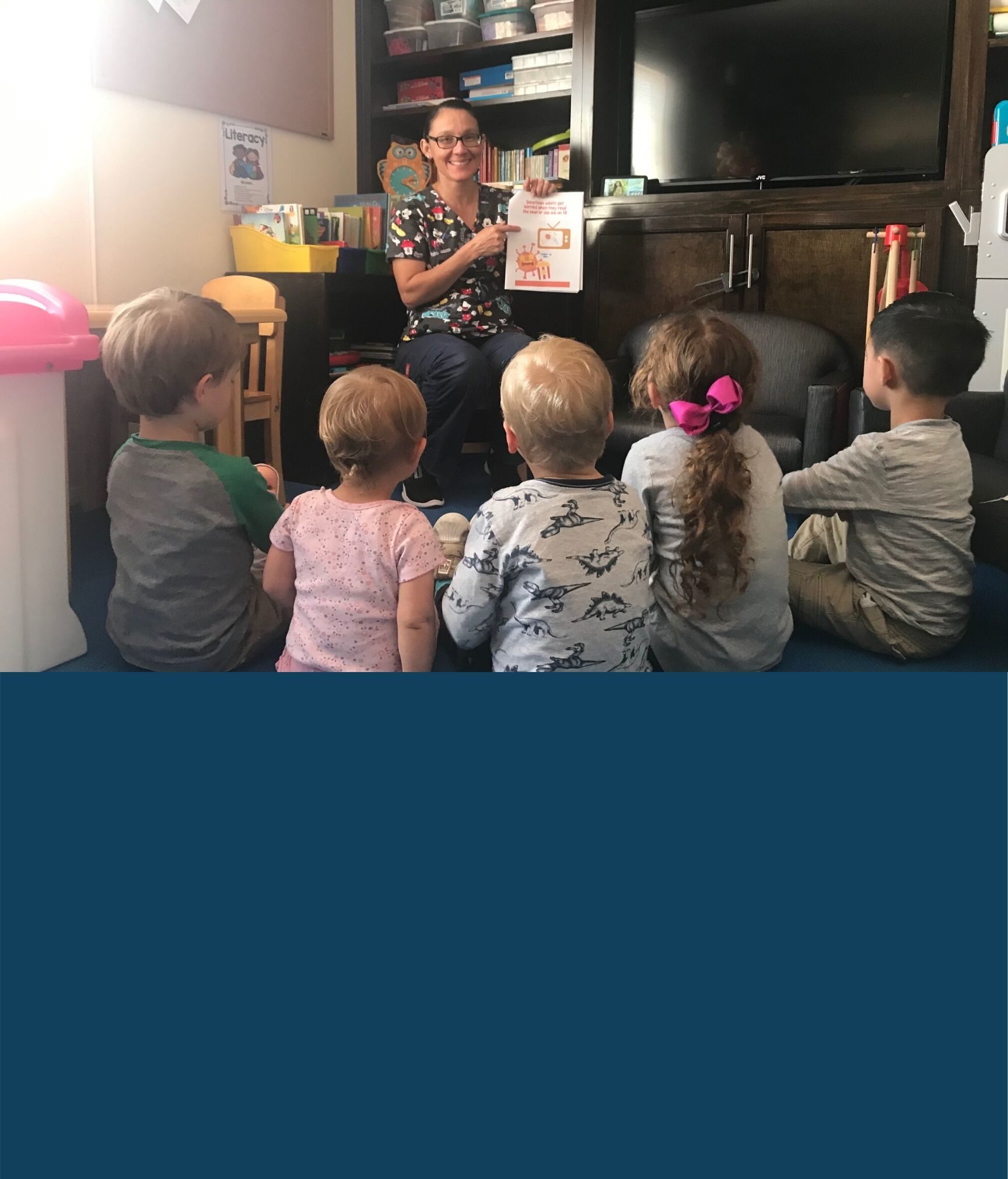
“We too, are fighting in the front lines along with and in direct support to our medical personnel and first responders. We must be provided the same access and benefits as first responders. I want to remain open and hope that I don’t have to close because I ran into health issues, out of supplies or into further debt.”
Mitzy’s profile in the San Diego Tribune:
Task during the pandemic: Providing childcare services for first responders by giving a safe and secure environment for their children so their parents can go to work worry free.
How has the pandemic changed your job?: It has created a new set of norms that have affected all families involved by implementing social distancing with parents and providing updates of awareness and education to children and parents related to COVID-19 and policy changes. These are applied to prevent the spread of the virus, safety and security of all involved, and trying to minimize anxiety and stress that affect all involved every day.
==> Read Mitzy’s full profile in the San Diego Tribune.
==> Find out more about the work of YMCA of San Diego County
COVID-19 has impacted my business because this virus is very quick spreading and it has decreased the number of children that I normally have in my care. I normally have 14 children that I care for and due to this public health pandemic I now only have 4 children in my care ONLY because their parents are essential workers. It has also impacted my cleaning supplies as we are disinfecting more on a daily.
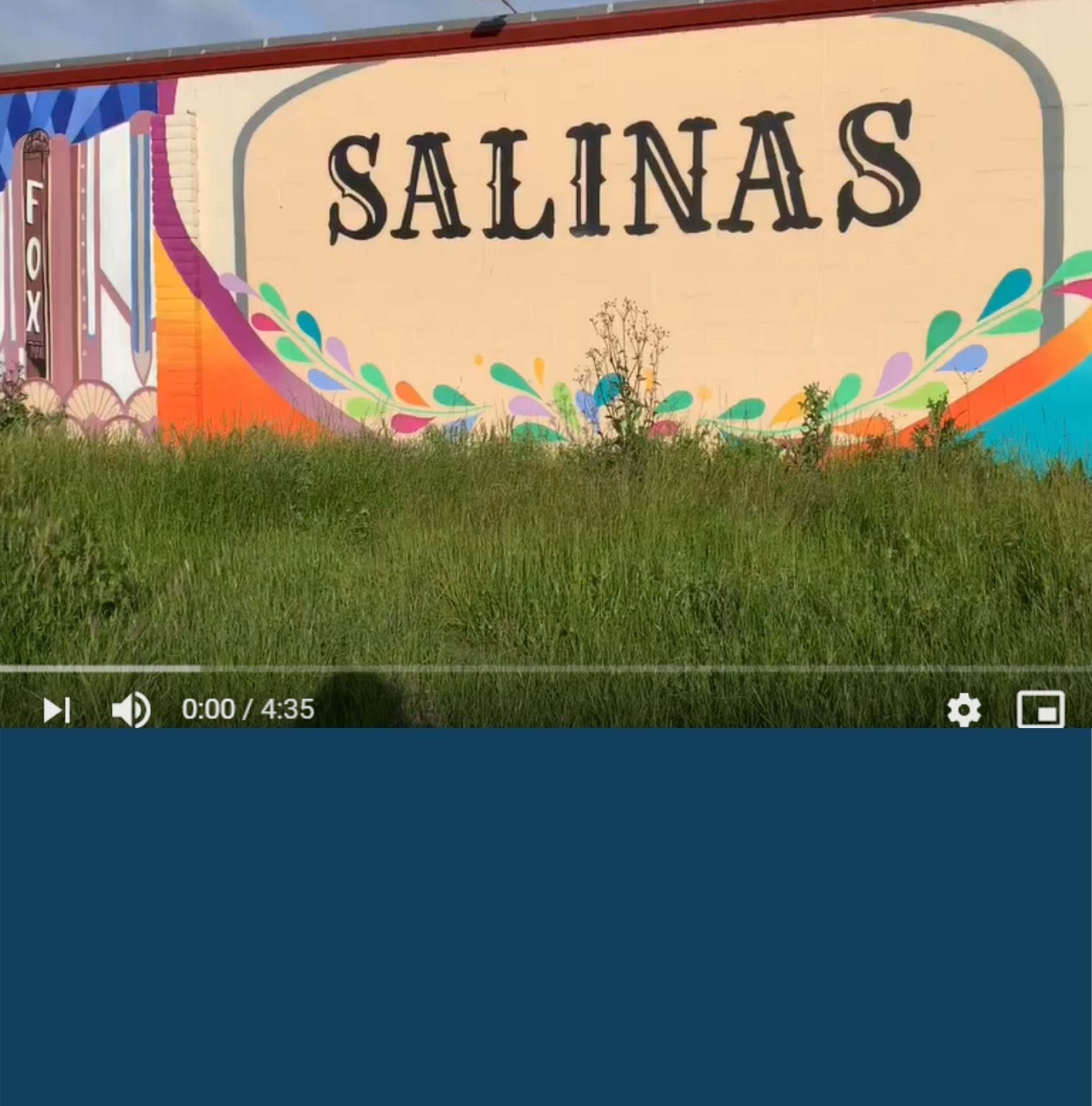
“A view of our amazing and beautiful Monterey County, and a glimpse of the heavy dark clouds Poverty is playing in our state,” says Adrina. Mother and parent advocate Adrina put this video together for End Child Poverty California to shine a light on Salinas and what’s happening with farmworker families and families in poverty during the COVID-19 crisis and every day.
Some of the hardest hit industries employ a huge number of undocumented workers and it is the invisible workers that really make up the backbone of those industries,” said Lucas Zucker, policy and communications director at CAUSE.
“You may see the people at the front desk of the hotel but you don’t see the housekeeping… who are already lower-paid workers, less likely to be tipped, and more likely to live paycheck to paycheck and who are now largely unemployed or severely unemployed,” said Zucker, who added that undocumented immigrants won’t receive $1,200 stimulus checks and can’t apply for unemployment insurance.
Read the full article about advocates pushing for a disaster relief fund for undocumented Californians here in the VC Star.
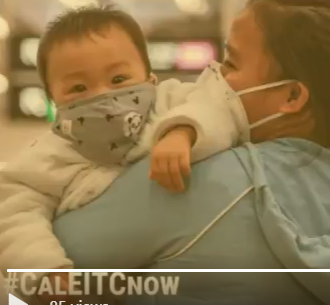
Listen to Julieta, from the I.E. share why expanding CalEITC matters to her.
Immigrant families excluded from Unemployment Insurance, federal #COVID19 relief aid, #CalEITC@GavinNewsom, #MakeItForAll and expand #CalEITC – we cannot afford to wait: https://t.co/FMYTvCaYAA pic.twitter.com/J8WaBjncPP
— ICIJ (@IC4IJ) April 14, 2020
Fathers & Families of San Joaquin reached out to our youth to survey their needs and found that food was the topmost on the list, among others like mental health support. We visited some of these youth’s home with bags for food drop off, but we could not satisfy all. Our workers went to a Migrant’s camp also for a food drop, and it was a mixed feeling (experience) to see little ones happy when we brought food to their parents. Our children do not need to starve to death due to problems they know nothing about. Please save our kids by providing food for them in this terrible time of trial and trauma.
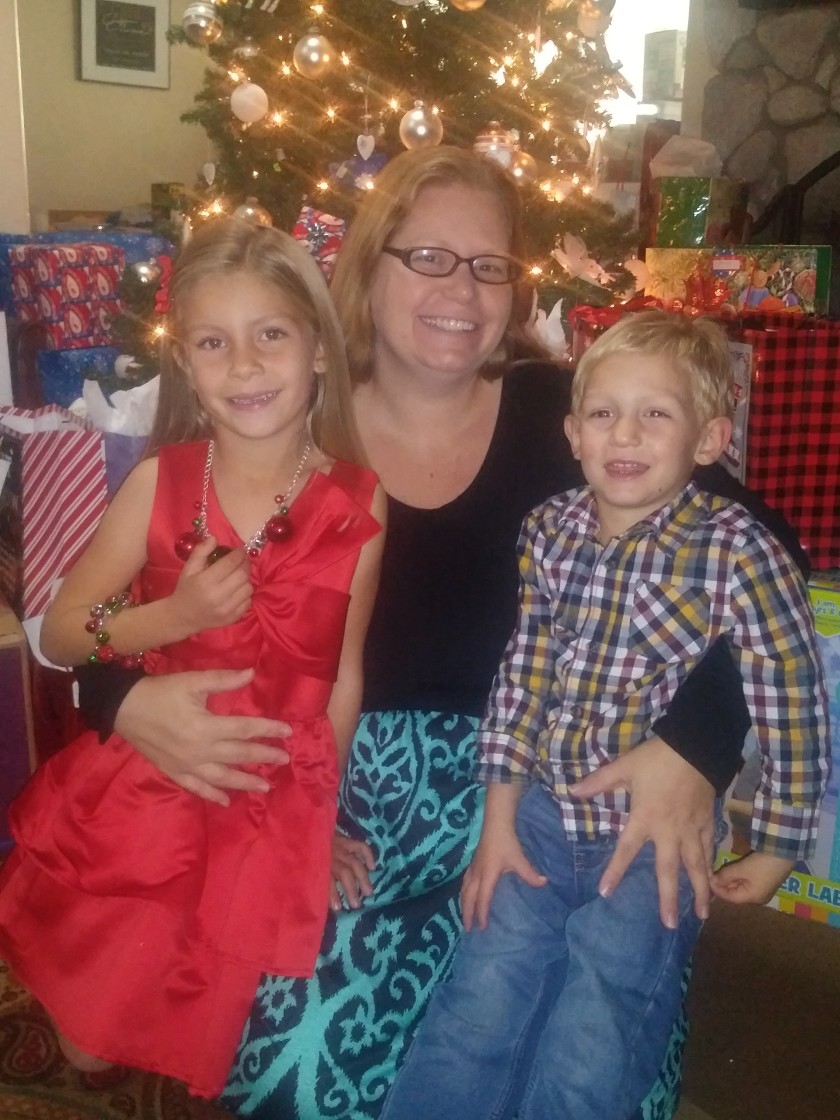
It is my duty as a licensed child care provider to provide the best care possible for all of my children, to support families during this difficult and stressful time and to provide continuity of care. However, often times we are unable to find supplies to maintain our stock of cleaning materials.
[The pandemic] has caused a severe impact on my income due to children not being able to attend. I am in a constant state of worry that one of the children or their family members will become ill, and then I would have to close down. On a positive note, we have been able to enjoy our outside environment for longer periods of time learning about our surroundings.
We have heard multiple instances of hospital nurses having to watch each other’s children in their off-shifts, leaving them exhausted and ill-prepared for their time in-hospital. Here in San Diego, our child care system is intact, it is the expense of the additional hours (typically covered by school hours), which proves cost-prohibitive for these nurses.
A first-responder recently recounted a story to us of having to leave their children in an air-conditioned car in order to perform the essential duties of their job. Again, because paying for child care is cost prohibitive.
Child care reimbursement rates do not reflect the true cost of care. In the current crisis, most child care providers would be making more on unemployment than staying open. But as essential workers, they are actively and courageously serving because they know their communities need them. After COVID-19 is over, we have to recognize this system as a critical piece of emergency response and support it in a way that values, and no longer exploits, this critical workforce.
Report from the field from San Diego for Every Child, 5/1/20
80% of people coming into get food now are coming in to get it for the first time. The situation is dire. We’re dealing with three crises at once: the pandemic, the economic collapse, and massive hunger.
-Father Jon Pedigo, Director of Advocacy and Community Engagement, Catholic Charities of Santa Clara County, in a 5/1/20 End Child Poverty California legislative video call with Rep. Zoe Lofgren
==> Visit the Catholic Charities of Santa Clara County site.
More than ever, it’s essential to address the needs of children and families. Most families will receive about two thousand dollars in the next two months, and that doesn’t include families who don’t earn enough to receive the tax credits.
At United Ways, when we walk someone through a tax refund process, it’s not uncommon for them to burst into tears when they find out that they’ll be receiving a tax refund. That’s how much even $500 means to a family.
-Anna Hasselblad, Director of Public Policy, United Ways of California, in End Child Poverty California movement federal legislative video calls with Rep. Adam Schiff (4/28/20) and Rep. Zoe Lofgren (5/1/20)
==> Find out more about how families are struggling to stay afloat in California.
The demand for our food has exploded. We’ve seen an increase tenfold in people’s demand for food–new and old clients.
For many people, it’s shifted from a supplemental supply of food to their main source. We have runners who deliver food to people who must stay at home. We have shoppers who do grocery shopping for people who must stay at home.
The rising need is quickly depleting our food bank, the shelves are nearly bare.
-Jeff Weiner, Director of Public Policy, Center for Children and Youth at Jewish Family and Children’s Services

As voices everywhere speak about “our common experience of suffering” during the COVID-19 pandemic, we risk obscuring the struggles of our already marginalized young people — youth who are homeless, those being trafficked, and those involved in the foster care and juvenile justice systems.
For those youth and young adults, the pandemic preys on their pre-existing conditions of trauma, victimization and pervasive insecurity.
As the executive director of California Coalition for Youth (CCY) and director of Youth Engagement for the California Children’s Trust, I’ve heard directly from many youth who are struggling now more than ever.
What I’m seeing is hard. And I know hard.
When I was 14 years old, I was homeless for months and spent my childhood and whole adolescent life in and out of foster care. I remember the daily panic and deep fear I felt as I worried about having a place to sleep at night. For a young person living on the streets during COVID-19, that panic and fear are multiplied many times over.
-Jevon Wilkes, California Coalition for Youth, in the Chronicle of Social Change, 5/4/20
Because of the existing fragility of the system of care, a recent national analysis showed that we could lose up to 4.5 million child care slots as a result of this crisis, including losing an estimated 51% in California if child care providers don’t receive support in the next few weeks. In addition, the cost of providing care in this new environment is higher. Child care providers have to lower ratios, constantly clean equipment, toys and facilities and were not provided the supplies, funding or protective gear to meet the new requirements. The two main requests of the End Child Poverty coalition related to child care are:
-provide immediate support to child care workers, to serve essential workers and waive family fees for subsidized childcare providers for families earning less than 250% of the Federal Poverty Line
-pay providers to cover ongoing COVID-19 operating costs whether they are open and serving families or needed to close due to stay at home orders.
-Stacy Lee, Managing Director, Early Childhood Project Integration at Children Now, on an April 30, 2020, advocacy call with Representative Anna Eshoo
We are seeing unbelievable needs. In the last 6 weeks we’ve already distributed 30,000 diapers, thousands of meals and other essentials like soap, and the demand is getting greater every day. We’ve provided 700 digital devices to preschool-age kids, because the digital divide affects them too, not just the K-12 students. We are the safety net — the wraparound services – and we’re keeping kids engaged. At one of our partner schools in Watts, out of 350 students, 150 are unaccounted for. We’re really looking at a lost generation of students at this point. The services for pre-k through community college are so crucial.
– Martine Singer, President & CEO, Children’s Institute, in a 5/12/20 End Child Poverty California legislative video call with Rep. Jimmy Gomez
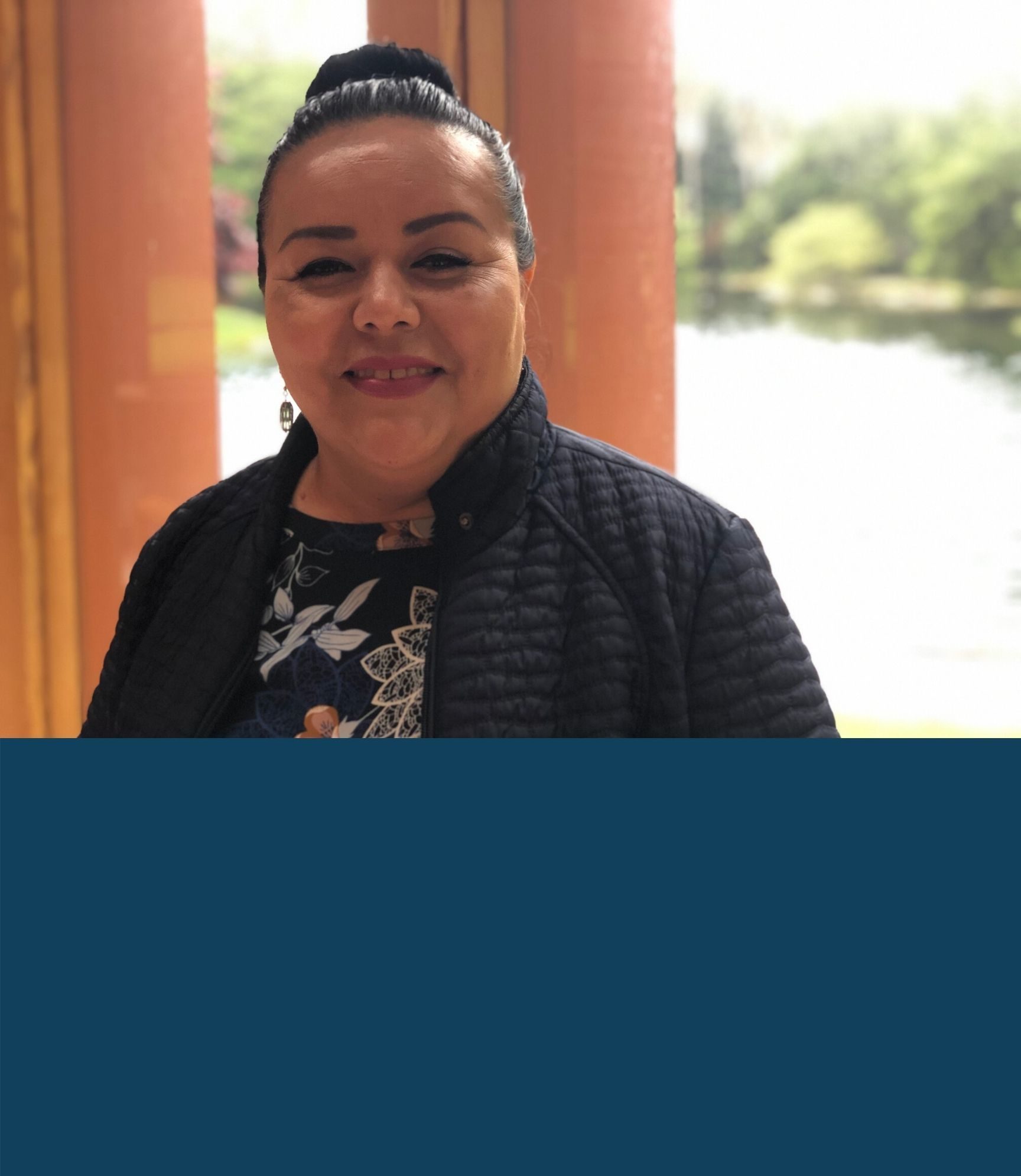
This crisis affected us in the saddest way, since the beginning of the year we were struggling with my sick mother-in-law. She lived in Tijuana and we decided to bring her to Chula Vista to take care of her. I had to give up one of my jobs and volunteering in my community to be able to take care of her and take her to Tijuana for emergency visits and to accompany her when she was hospitalized in Tijuana. I would leave my children here, with my husband about to lose his job due to work absences [because of the family illness]. Almost a week ago my mother-in-law finally passed, and we have to go through the sadness of not being able to watch her and not being able to attend a mass on her behalf accompanied by family and friends. Yesterday we finally decided to cremate her body and we took her ashes to her house to wait for this crisis to pass.
Also, there is so much information floating around that they will close the border and we have to be going back and forth, and the jobs that I had cleaning houses have also been suspended for the moment. With the fear of contamination entering and leaving hospitals.
For those of us who have parents in Tijuana, we can at least cross, but there are others who, for 15 to 20 years have not been able to see their parents. My in-laws did not see their mother and she just died and had 3 children, only one was able to be there and was the one who buried her. The child who lived with her and the daughters here are crying with the pain of not having seen their mother anymore.
I suffer from high blood pressure due to stress, they had to take me to the emergency room two times to control it. I can only imagine for my husband how difficult things are; his work, his mother, and I, in addition to the economy, all very difficult. The good thing is that we had a credit card that we have been able to use, but while we have health and life, God will provide….
-Andrea Nuñez, Community Advocate, Chula Vista, California
A nosotros esta crisis nos afectó de la manera más triste, desde inicio de año estuvimos batallando con mi suegra enferma ella vivía en Tijuana y decidimos traerla a Chula vista CA para cuidarla tuve q renunciar a uno de mis trabajos y mi voluntariado en mi comunidad para cuidarla y llevarla a Tijuana a emergencias y acompañarla cuando quedaba hospitalizada en Tijuana dejando a mis hijos aquí mi esposo a punto de perder el trabajo por faltas. Hace casi una semana finalmente mi suegra murió, y tenemos que pasar por la tristeza de no poder velarla y no poder asistir a una misa en su nombre acompañados de familia y amigos, ayer finalmente decidimos incinerarla y llevamos sus cenizas a su casa a esperar q esta crisis pase
Además, con tanta información de que cerrarían la frontera y nosotros tenemos que estar entrando y saliendo, y los trabajos que yo tenía limpiando casas también suspendidos por el momento. Con el miedo de un contagiarnos entrando y saliendo de hospitales
Para los que tenemos padres en Tijuana, nosotros por lo menos podemos cruzar, pero hay otros que hacia 15 o 20 años no veían a su madre y acaba de morir y de ser 3 hijos solo la velo, y la enterró uno de ellos, el que vivía allá con ella y las hijas aquí llorando la pena de no haber visto más a su madre.
Yo padezco de presión alta y por el estrés tuvieron que llevarme a urgencias 2 veces para controlarla, imagínate para mi marido que difícil; el trabajo, su madre y yo además de lo económico muy difícil. Lo bueno que su tarjeta de crédito soportó, pero mientras hay salud y vida Dios proveerá…
-Andrea Nuñez, líder comunitario, Chula Vista, California
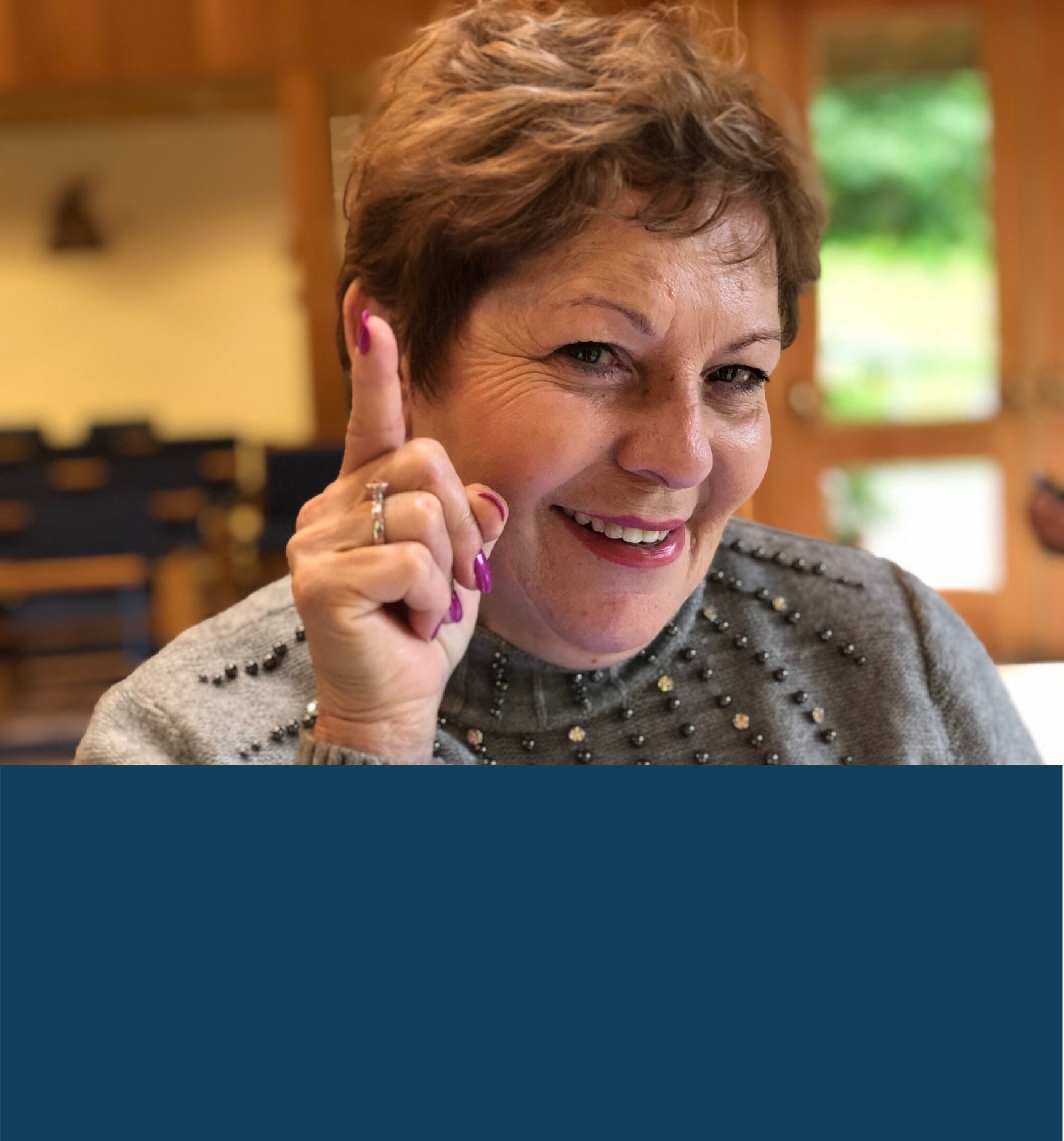
To whom it May concern;
How is this crisis affecting me? To begin with, I cannot be with my close family or relatives and vice versa, as for food, we are measuring ourselves as to not overspend. I do not visit the doctor, even though I need to go to the dentist and I won’t be able to for now.
In the community, one can see the entire economy fall apart. How will schools end their school year? People who lost their jobs, how they will pay for their house and meals?
From home, I can only help with my prayers and comic videos I share with my friends to make them laugh for a while.
Si Se Puede! Yes we can!
-Ceci Boison, Community Advocate, Chula Vista, California
A quien corresponda;
Como me esta afectando a mi esta crisis – Para empezar, no puedo estar con mi familia cercana ni familiares y viceversa, pues en comida si nos estamos midiendo y no visitas al dr. Necesito ir al dentista y no podre por lo pronto.
En la comunidad no se diga toda la economía se vino abajo. Las escuelas como van a terminar su ciclo escolar. Las personas que se quedaron sin trabajo. Como pagaran sus casa y comidas.
Yo por pronto de casa ayudo con mis oraciones y videos cómicos para reír un rato.
¡Si Se Puede!
-Ceci Boison, líder comunitario, Chula Vista, California
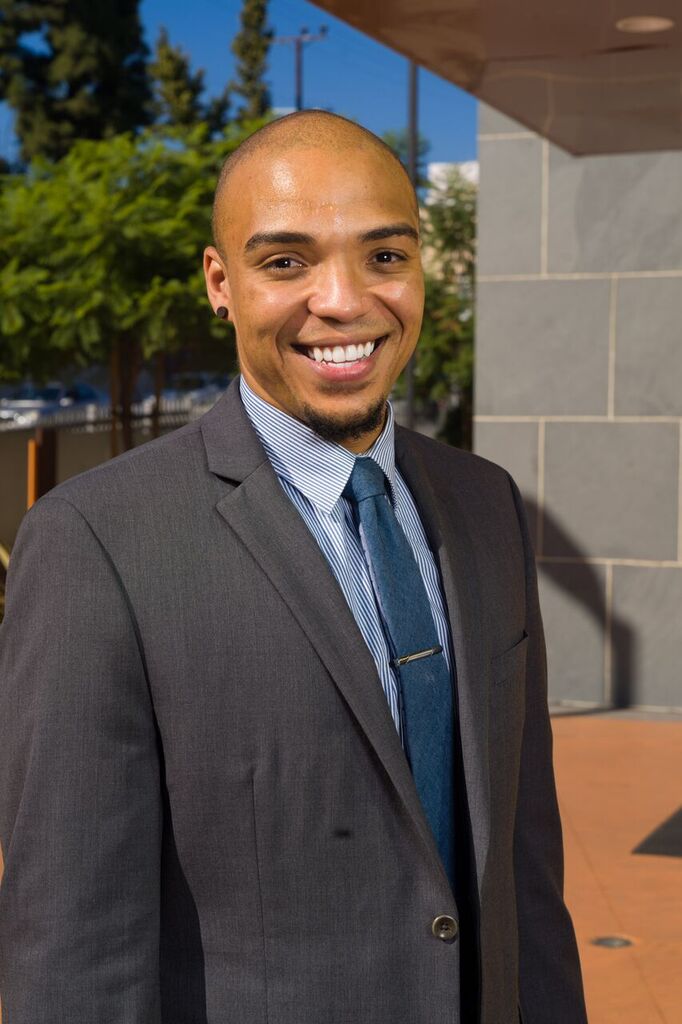
I have been homeless. I resided at the Union Rescue Mission in Skid Row for two years with my father and younger sister, just over a decade ago. My father was, and still is a very capable parent – a fact conceded by the Los Angeles Superior Court system when he was ordered full custody during a hearing between my parents. Instead of ensuring housing could be provided for us as a family unit, he was tasked with providing a roof over our head, and a social worker recommended Union Rescue Mission. In 2008, that is where we went – assigned a room just large enough for two bunk beds and a mini-fridge, with a court order that included mandated therapy, case worker visits, parenting classes for my father, and supervised visits anytime we wanted to see my youngest brother who was still in the system.
I am sure much thought went into the decision to release my sister and I to my father. The case went on for years and the court order provided the stability I had long yearned for, even if it resulted in me living in a small room, in one of the longest running homeless shelters in Skid Row. The court order was not well-rounded though. Most importantly, it was missing housing assistance – I was ordered to live on Skid Row by the Los Angeles County child welfare system (please let that sink in), and it wasn’t temporary, nor was it transitional. It was missing clothing assistance – my sister and I relied on the Union Rescue Missions “closet” to replace what we lost moving from placement to placement while we were in care. It was missing flexibility – my father was forced to miss work and needed income to fulfill his parenting class mandates, and to maintain his custody of his children. It was missing care – with my little brother’s placement forcing my sister and I on the bus to go see him, it meant we didn’t see him as often as we’d hoped; It was a 3 hour bus ride for us, but a 45 minute drive for my little brother’s case worker. It was missing love – a reminder that there was no impactful follow-up nor beneficial regard for what our lives would look like years after we were ordered out of the child welfare system.
I lost my sister to the streets when she was 24, a transition aged youth, on September 13, 2017. She was homeless, and the Los Angeles County child welfare system failed her. I miss her everyday, and everyday of my life I work to lift the voices of the transition aged youth who are still here. I have helped Fortune 500 companies at a PR Firm, and I have written legislation for one of the largest cities in the country: Los Angeles. But I have loved no work more than the work at The National Foster Youth Institute, and alongside the EndChildPoverty campaign, which allows me to hear the stories of young people who remind me of my younger sister.
While the child welfare system is menacing and traumatizing, young people who have emancipated from the system have more than just strength and tenacity – they have found in themselves a reason to live and to continue pushing forward. Despite a system that seems to be designed to keep them at their lowest, I have met young poets and creative artists whose empowering work gives me goosebumps. Despite a system that habitually seeks to destroy the will of our youth, I have met some of the most unbreakable spirits who, despite being unable to access love in the child welfare system, continue to love with abundance, even for those who loved them too little. Despite a system designed to control youth in it’s care, I have met young people whose optimism for their future demonstrates they are in full command of their own destiny’s and their freedom.
The trials young adults must overcome as a result of the child welfare system create significant barriers to growth, but despite it all, tens of thousands of transition-aged youth continue to push forward. We are all worthy of love. And when my sister was experiencing her darkest moments, a system designed to protect her should have been there to catch her when she fell off her feet – to show her she was worthy of love. It wasn’t there for my sister, but as we navigate a most uncertain future, it must be there for those young adults who are still here. For those aspiring artists and freedom fighters, for those parents seeking to provide the best for their kids, for young survivors of the system like myself who have had to question their success every step of the way, we must end child poverty NOW, and break a system that has resulted in the loss of life of too many of our young brothers and sisters. We must bring about an end to a vicious cycle that oppresses liveliness, and conditions our youth to cope with a broken system we know needs beneficial transformation. It will take a village, but we must demonstrate respect for our youth and provide them with the love they are worthy of receiving.
-Kenneth Chancey, Policy and Organizing Manager,
National Foster Youth Institute

My name is Micaela Mota and I am an essential worker who is also a mother to a 16 and 1 year old. I am a member of Parent Voices Contra Costa County.. I am currently a 4.0 grad student pursing two Masters degrees as a Marriage Family Therapist and School Psychologist and work full time. I have been on the subsidized waiting list since October 2018. Because I work full time, my income makes me “higher income.” Because the child care system has been underfunded for so long, and families are served by lowest income first, the chance of me getting off the list is very slim. My income as a bilingual mental health provider is not enough to pay full daycare fees, I use the remainder of my student loans for grad school and I took a second job delivering for uber eats on the weekends to pay for day care. I barely saw my baby.
I provide mental health services to adults, either homeless or vulnerable to homelessness. My essential duties are to provide case management, rehab, and therapy to my clients. This particular population requires collaboration with Psychiatric Emergency Services, Inpatient Psychiatric Hospitals, Crisis Residential Programs, jails, legal services, and other community resources to assist the clients in avoiding self-harm or harm to others. I may have to go to these locations, homes of the clients, and homeless camps in order to provide support and services. I am grateful for the emergency child care voucher for essential workers because there were 1,000 children ahead of my son waiting for subsidized child care in my community. It’s only because I am an essential worker I was able to get care. It has eliminated the worry of how my child will be cared for so I can be focused on treatment of my clients without interruptions, especially with a one year old. An interruption can make the difference between life or death. COVID 19 pandemic has not made my essential job easier as many of my clients are experiencing an increase in psychosis, paranoia, mood, and anxiety symptoms.
The Essential Worker voucher has allowed my son to continue to attend Anielka’s Family Day Care, where I know he is safe, getting his needs met, and learning basic skills vital in early childhood development. Because of the voucher I was able to quit my 2nd job and get to spend that time with my young toddler and teenager who both need me right now. Getting back my nights so my toddler can fall asleep in my arms is everything during times of such uncertainty. I need it just as much as he does.
Essential working parents should not have the added stress of juggling childcare and providing vital services to the community. Right now the voucher expires June 30th. CA may be re-opening, but without a vaccine, COVID could return and my job will still be essential and my ability to continue to work depends on stable, reliable child care. In the fall I will be starting a new job as a school psychologist and will earn less money. I will still be an essential worker helping children with special needs who have an IEP and supporting the mental health of our students. Earning less money means I will need the child care voucher even more. My loans are almost out, the idea of having to get a 2nd job again stresses me out.
Parent Voices has worked very hard and the Legislature has changed the law to ensure every voucher offered by the state is a minimum of 12 months, the Childcare for Essential Workers should be no different. I believe the essential work I am providing my community should be recognized and having not to worry about childcare and the safety of my child is how the state can really support me. Without action to extend this voucher, I will return to the waiting list, what parents call the No Hope List, and my son will miss out on the critical early learning opportunities that will set him up for life. On behalf of all essential working parents, this is our only chance to have access to at least a year of stable, affordable child care, we need your help today. Thank You.
-Micaela Mota, Parent Voices Leader
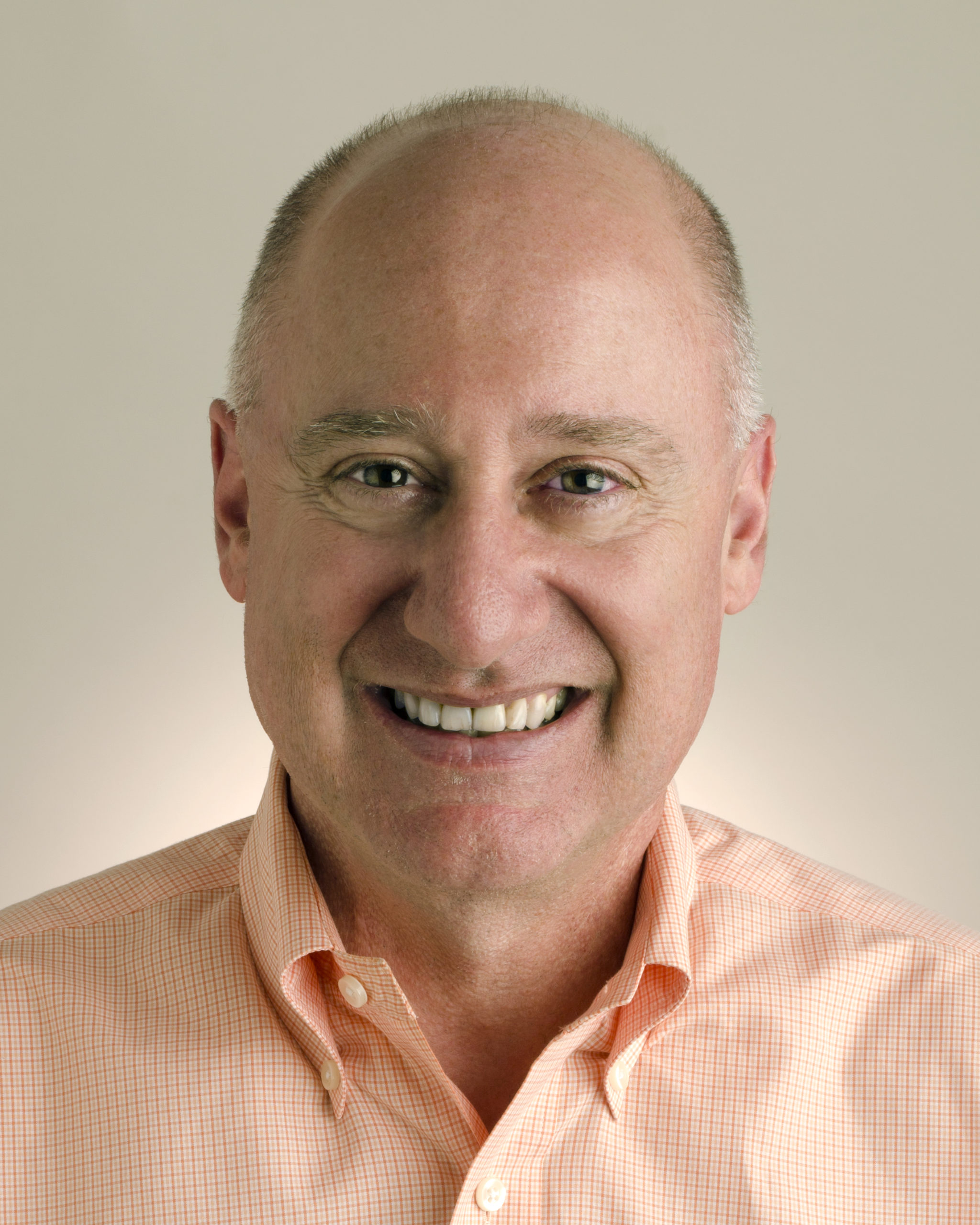
Child care was in crisis before this crisis. Child care is essential for the child as well, to get education. We know how much better supported children are when they enter kindergarten if they’ve had good supportive child care.There hasn’t been enough focus on how little support our kids in CA are getting. Learning from history…when we look back at the last recession, child care got hit the hardest.
-Ted Lempert, President, Children Now

First and foremost, thank you so much for having me today.
My name is Adrina Carmona and I am the president of the Monterey County Parent Council for Head Start Early Learning Program. I currently live in the ‘Nobel Prize’ and ‘Pulitzer Prize’ winner John Steinbeck’s hometown of Salinas Ca.
A rural area surrounded with endless agriculture, deep history and severe oppression. Steinbeck wrote about the injustice he saw within our community, and 90 years later I am here with you today to speak on the same issue.
We have come a long way in 90 years, but we have so much more work to do. I cannot begin to express how grateful our community is for programs like Head Start. I have personally been witnessing the compassion and endless support our Head Start Employees give to our community tirelessly. Giving our undocumented immigrants the stress release now and ongoing. Farmworkers and others immigrant workers are essential and are a majority in our community, and Head Start gives opportunities to educate themselves with all resources available within our community. There are so many beautiful success stories within the Head Start foundation, giving families the ability to build brighter futures. Unfortunately, many have been laid off or do not have access to childcare. The situation is desperate. Please support immigrant family inclusion in the California Earned Income Tax Credit and ongoing wage replacement for undocumented workers.
I want to end with a quote and a small request from all of you today
A John Steinbeck Quote
“I wonder how many people I’ve looked at all my life and never seen.”
With everything going on in the world today, my request is to take a moment out of your day today and everyday to see the people you love and see the people around you every day. Smile make small talk when you are inline buying groceries. Let us Inhale everything that’s going on today and let’s Exhale Love into our communities.
-Adriana Carmona, President, Monterey County Parent Council for Head Start Early Learning Program

I am September Hill from Crystal Stairs. I coordinate our Community Voices advocacy training program. We train parents and providers in Los Angeles County to advocate with skill for access to quality child care and early learning.
During the pandemic, our in-person programming has pivoted to online platforms and telephone calls. I have kept in touch with our parents and providers, so I have been able to hear directly from them how the pandemic has affected their lives and their child care businesses.
For our low income working families this has been another layer of struggle on top of pre-existing struggles. Several of them were laid off or working from home, or have continued to work because they are essential workers.
For our providers, some have chosen to close and others have remained open. According to Child Care Alliance of Los Angeles, about 52% have remained open across Los Angeles County. These were difficult choices these providers have had to make – choosing between maintaining a business or possibly compromising their health.
Of the providers who have remained open – several had a drop in the number of children they serve, because parents have chosen for various reasons to temporarily take them out.
One provider I spoke with said she had 8 children before the pandemic and now she was down to 2 children. The children that stayed are children of essential workers – a janitor at Wal-Mart and a receptionist at a medical building. She said her income has gone down, and she does consider her health, but she says “It’s my job to be here for the children.”
When we look at the child care programs (both centers and Family Child Care Homes) that have closed, in our service area, 95 out of 1500 have closed. You might think that’s not too bad. But when you think about the impact – that means 1300 children who are not learning and families who need to find other child care alternatives.
The 10% rate cuts that the Governor proposed would do tremendous damage to the child care providers and to the families who rely on them to stay open. Fortunately, both the Senate and Assembly rejected the rate cuts, so I hope they can convince the Governor to compromise on that issue.
We often get absorbed in the statistics and forget this data tells a story of people’s lives. I would like to share with you a few statements from child care providers from Community Voices:
“We are currently operating at a loss. I don’t know how we are expected to survive a 10% rate cut and the lower class ratios. We can’t afford it. As a FCCH, after I factored in all my expenses, I figured I made $1.25 an hour and work over 50 hours a week, in an environment where I am afraid for my health.”
“I know at least 12 providers who are closing. Many centers have closed. Children are not attending, because their parents don’t want to take the health risk of sending their children to a group setting.”
“It’s like the government and the child care system doesn’t care about us. The only thing I can count on right now are donations.”
Our child care providers are essential workers. They are essential to working parents who need child care to go back to work. They are essential to the children who want to learn. And Child Care is essential in order to rebuild our economy.
But when rate cuts are proposed under the guise that “We made 10% cuts across the board – so it’s equal.” We don’t want equal cuts in a system that does not compensate equally. We want equity. So let’s put our money where our values are and reject these cuts and continue to find ways to create a stronger sustainable child care workforce and infrastructure that our providers, our families and our children deserve!
-September Hill, Community Voices & Crystal Stairs

My name is Yessika Magdaleno. You and I share something important in common. We all go to work each day with a grounded, deeply-held belief that we do our chosen work for one very simple reason: TO CHANGE THE WORLD.
I and many other providers don’t work in the halls of Congress, but in our homes, caring for children in our Family Child Care settings. Mine is located in the city of Garden Grove, I have been doing this for 19 years. I’m here representing the family child care providers in California. And the California Family Child Care Network.
What other reason, aside from wishing to impact with future, could motivate someone to take on a job with modest pay, no benefits, and no paid time off?
This isn’t about a “job” for me and 30,000 other family child care providers. This is our profession, our chosen life’s work – and it is an amazing gift we
are given each day to partner with the families we serve.Today I’m here talking to you all about the difficulties we are facing with the COVID-19 first off all the new regulations we received from the department of
community care licensing have not been easy for us. Since we run our business from our homes the space has been a challenge. Communicating with licensing has been difficult, understanding what is expected from us and delivery with no support for cleaning supplies, toileting supplies, not being recognize as an essential worker from many companies like Costco, not getting paid right from the agencies like CDA for the full time students that at not at school but with us and taking the risk of get contagious not only us but our own family as well.
And, on top of that having to worry about the 10% proposal cuts on the Governors May Revised budget…The proposed cuts will mean that for many family child care providers would no longer keep their homes open. This 10% cuts that the Governor is suggesting would include for many of us to let go of our own employees because it would not be enough money to pay their wages. It means families will not be able to receive help for child care. We are small business owners, with real business expenses that will not be cover if you cut the 10% of our income. Today in the name of all Family Child Care Providers in California we ask you to pledge on our favor by rejecting the 10% cuts.
Thank you for your time all the efforts you do to give us a voice…
-Yessika Magdaleno, Child Care Provider
I will speak truth about the power of sharing your story as a parent, as a community member, an activist, and an advocate. It first takes courage to be vulnerable enough to share your story to people you don’t know personally. It can be fearful to tell your story because of how uncomfortable the pain is in your chest when you relive a traumatic experience. It takes bravery to tell your story in hopes of change. I tell my story over and over again because I have a 6-year-old son looking up to me. I want to teach him that his voice matters. When we are vulnerable sharing our story, we inspire others to speak up when they’re fearful. Vulnerability is strength!
-Monique Rosas, End Child Poverty California & Dolores Huerta Foundation Organizer

Good morning, welcome to Child Care and End Child Poverty California’s first Virtual Advocacy Day. Advocacy days have been my favorite time of the legislative year because when I was with Alameda County Community Food Bank, I organized hundreds of people to go to the Capitol and speak to their legislators, and it’s a joy when people learn that it is their right and responsibility to do so, and when they return bringing their friends. We’ve been in shelter in place for a few months now, and though we are in the virtual space, I have had impactful virtual meetings with legislators and I hope you all do the same today. So thank you for being here in this new way with us.
This has been a tough few months, from coronavirus and the economic downturn to witnessing the killing of Black people and more police violence in reaction to thousands of protesters across the country and the world. It’s made me think about how as advocates, we read and study and recite a lot of data about poverty and the data is almost always broken down into race and sex, and Black people and Black women are almost always shown to be the most poor, the community with the most serious chronic health issues, the ones struggling the most to get an education and a job. The numbers are high for Latinx and other brown communities as well, and as a brown child of Mexican, Indian, and Filipino descent who grew up poor, it’s hard, traumatizing even, to read these facts over and over, year after year. I was thinking more about why I feel that way, and I think it is because we have to cite these detailed facts and figures as evidence that poor communities are hurting, and evidence that Black communities are hurting. We have to show evidence. And to be clear, research and facts are important, but it is the repeated studies and showing of evidence without seeing enough progress that hurts. Systemic racism causes violence in a variety of ways – through police brutality, yes – and also through poverty and the constant need to provide evidence to have to prove that poverty exists, that generational poverty exists, that racism exists. The last few months make the evidence clear once again that there are racist policies embedded in our institutions that are exacerbating poverty and the length of our existence differently depending on the color of our skin.
Our community and coalition remain committed to preparing all children for a better future, especially Black and brown children who have been most impacted by poverty because of systemic racism, and we stand in solidarity with all who seek to build a just world for our children to inherit. So we’re here today, to exercise our civic duties to address these issues with our government, to hold our elected officials accountable to provide the resources poor families need to get out of poverty and help their precious children grow and thrive and to support our legislative champions. Another piece of evidence I mentioned in our January Lobby Day that I’m proud to recite is that studies show that when parents are given the resources they need, they take amazing care of their children, they lift themselves out of poverty, and they uplift communities. I want to see the government invest more in the policies and programs we’re advocating for today – we know they work.
So thank you for being here and being an advocate. We need you, we see you, and we are grateful to be in partnership with you.
-Shanti Elise Prasad, Senior Policy Advocate, California Association of Food Banks

Watch Sophia Jaquez share her testimony.
Hi, my name is Sophia and I’m from San Jose. I’m here to tell you that when I was 17 years old I was balancing being a teen parent, I was balancing working at McDonalds, full time, and also struggling to graduate with my high school diploma. This was too much stress for any 17 year old. And in the end, I couldn’t do everything. I had to stop going to school, and I had to focus on work, to pay my bills and survive. Truth is, if there had been a training program that would help fund me through school, I probably would be in my third year of college right now, instead of my first. That’s why SB1103 is so important. With this bill, we will be able to support our young people in getting back to work, with the funding that will help them thrive.This is why this bill is so important and you need to vote for it today. I was blessed to make it, but not everyone can. Please vote SB1103 for a better community, in our home of San Jose. Thank you.
-Sophia Jaquez, California Opportunities Youth Network

Watch Lesly Henriquez share her testimony.
Hello my name is Lesly, I’m 20 years old, I’m from San Jose California, and I have a baby girl who is two and a half. Some of the things that have got in my way for getting the job I want or the job training has been child care. Child care has been one of the biggest things I’ve had to deal with since my baby girl was born. Simply because they gave the spots to the people they think they need the most, and so that has been one of my biggest challenges that has got in my way. I have really tried to get child care for her and I have not been able to, and she’s about to be three. So, I’m hoping that I get child care very soon, but for this reason, I support SB1103.
-Lesly Henriquez, California Opportunities Youth Network

Watch Eustolia Farias share her testimony.
Hello, my name is Eustolia Farias, and I’m 27-years-old. I’m currently a California Opportunity Youth Network young leader. I began participating in the welding program at LATTC [Los Angeles Trade Technical College] and PCC three years ago. While at LATTC financial stress took a toll to my performance. My financial aid was delayed during the semester and because I could only work part time, I barely made ends meet. This cost me to transfer to PCC. Unfortunately when I was two classes away from finishing my certificate, I had to stop going because of the two-hour commute, which forced me to get up at 4am and get home at 6pm every day, which left me only a few hours to do homework, cook, and clean. The technical engineer department gave me an award for [being an] over-achiever. Had I not had these barriers, I know I would’ve made an excellent welder. I’m with you today to support California Senate Bill 1103 [the Highroads Workforce Development Training Program].
-Eustolia Farias, California Opportunities Youth Network
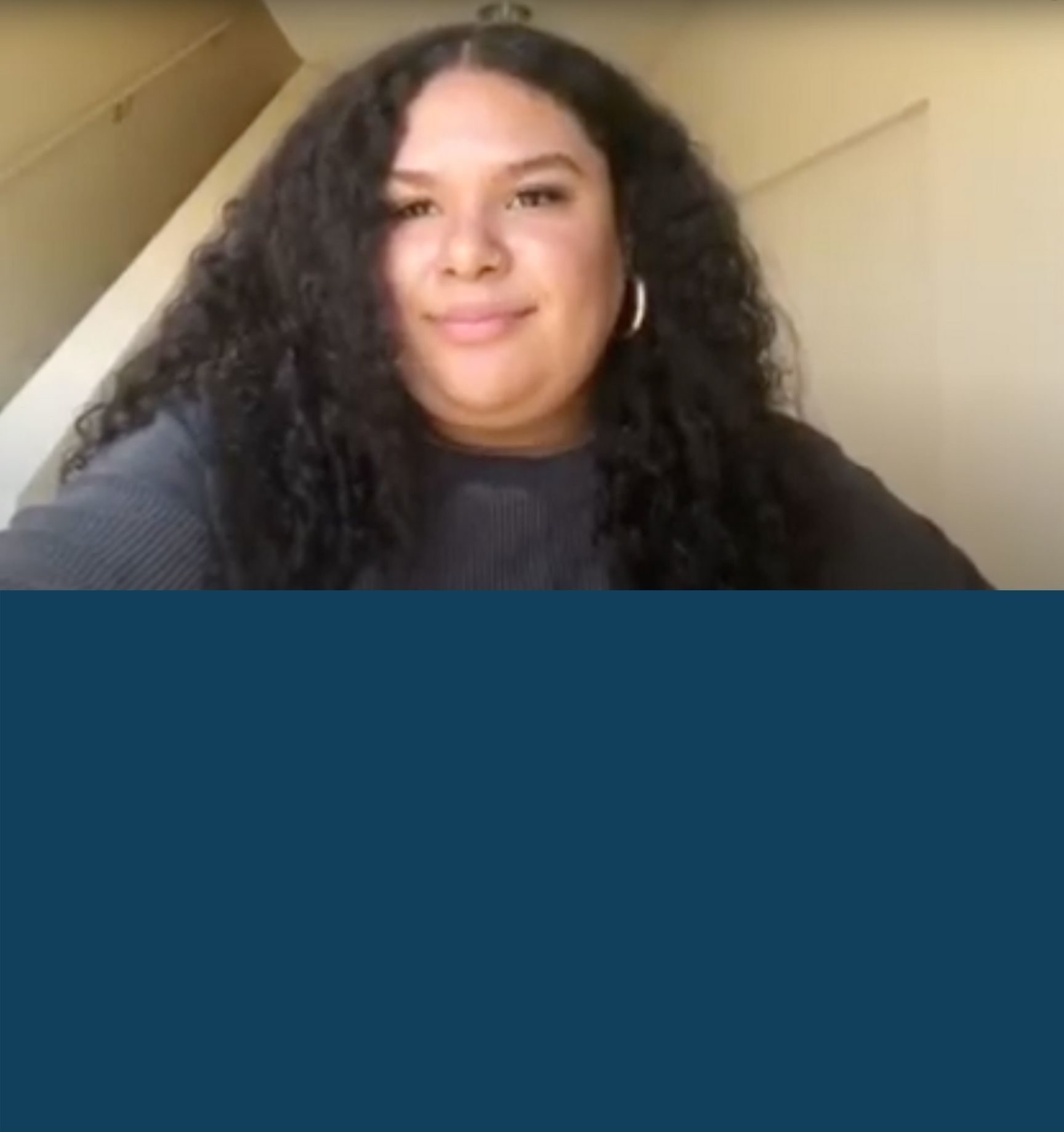
Watch Alicia Smith share her testimony.
Hi my name is Alicia Smith and I’m from Los Angeles, California. I am 27-years-old and I’ve been working since I was about 14- or 15-years-old. I come from a not so wealthy family, so it’s always been important for me to work, at a really young age. Also that meant working entry-level jobs, working jobs that were not in my direct career path. And so, now later on in life, I have now run into many barriers trying to find a job in my career path. I’ve been denied because of my lack of education, and because of my lack of experience, unfortunately. I truly believe that work training programs are very essential for underprivileged youth who don’t have time to work unpaid internships, who don’t have time to volunteer, because they need money in their pockets now. So I fully support Senate Bill 1103 [the Highroads Workforce Development Training Program].
-Alicia Smith, California Opportunities Youth Network
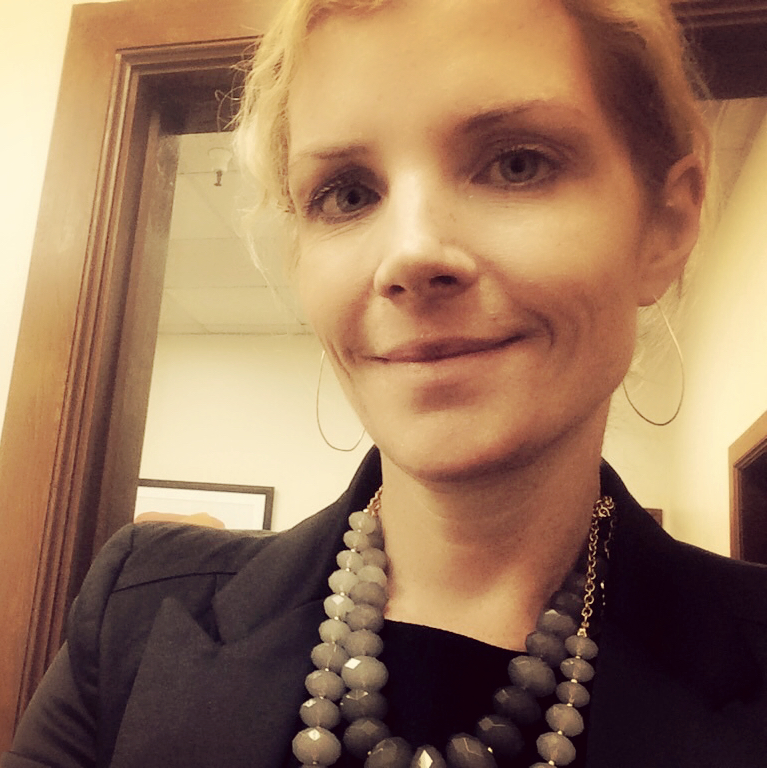
I’m Nina Buthee, the Executive Director of EveryChild California, we are a statewide organization that represents all state and federally funded early care and education programs across the state.
We are a member of the Early Care and Education (ECE) Coalition, a partnership of early childhood education advocacy and service organizations working together to secure access to high quality early learning and care for low-income children and families in California.
As we heard today, Child care and early learning has always been an essential support to our economy.
- Now more than ever, California needs to sustain access to early care and education programs to help our most vulnerable families through this unprecedented crisis.
- As well as to keep the economy going – and keeping the infrastructure of the early care and education system whole for all programs, LEAs, public and private providers
- We estimate 75% or more of the state-funded child care system serves children of essential workers.
As the Coronavirus crisis hit, and early care and education programs were considered an essential service, many programs weighed the hard choice of staying open or closing. Programs on school district sites almost universally closed, while a number of community based organizations stayed open.
As programs re-open, they are being held to social distancing rules and reduced capacity. We estimate that programs are running at approximately 30-40% of licensed capacity depending on age group serviced. Programs are being confronted with a myriad of challenges, additional costs associated with sanitation and disinfection and evolving public health requirements, such as fluctuating attendance, providers and teachers missing work due to illness, and smaller group size requirements to implement social distancing in child care settings.
I want to start by thanking the administration as at the beginning of this crisis they actively identified that child care is an essential service. They provided some additional expenditures during this time, and we want to specifically thank them for:
- One-time stipends for child care providers. $125 million to be spent in this fiscal year, for programs operating during the pandemic
- $73 million for One time funds to increase access for at-risk children and children of essential works
- Increase of 5600 AP spaces for CCDBG, prior to-COVID the federal last federal budget had an increase, pleased to see the recognition of these funds and will be able to provide more services to children
- Increase federal funds for the Preschool development grant to plan for child care and early learning into the future
- And the $8 million to extend family fee waivers
These are all great first steps for Child care programs—many of whom were already struggling to keep their doors open.
In order to preserve the existing child care supply and provide a bridge to keep programs open through the end of this crisis. The ECE Coalition has several recommendations to support the system:
- Administration expended $144 million for family fees and provider payments, the ECE Coalition asks that federal CAREs Act funding be utilized for this expense
- The May Revise proposes sweeping one-time general fund monies, for infrastructure and workforce. Though we have been advocating vocally over the years for this funding, we are supportive of these sweeps during this difficult time, to mitigate other reductions
- Biggest issue in the May Revise is the 10% cut to reimbursement rate for providers. Providers are not well compensated, and we are regularly asking more and more from them, but have done very little to support them. We ask them to risk themselves and their families during this crisis. Pleased to see the legislative agreement rejects these cuts. Look forward to working with the administration on these issues
- Lastly, rejecting the $100 cut to the Afterschool Education and Safety Program (ASES) which is part of the early care and education continuum to help families
Thank you for your time today.
-Nina Buthee, Executive Director, EveryChild California
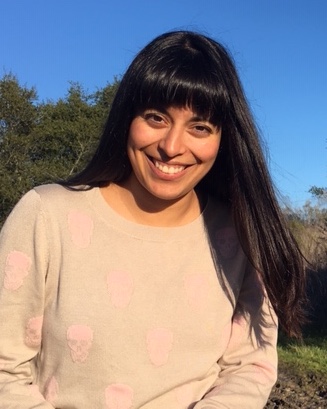
My name is Itzul Gutierrez, I am an Advocacy Manager at the Redwood Empire Food Bank, based in Santa Rosa, California. I am here representing the California Hunger Action Coalition, also known as CHAC. We’re a broad member based organization of food banks, anti-hunger poverty organizations, and here to speak today on the food program piece. No child should go hungry. Children deserve to have food available, as well as their families.
One of the programs that I’ll be concentrating on is SNAP, known here in California as CalFresh. For every meal food banks provide, SNAP/CalFresh provides twelve. It’s a great way to get food in the hands of families in our state. In addition, for every dollar spent for CalFresh, it brings $1.79 of economic activity. So, it’s a great way to bring federal dollars into our communities, and support our retailers, and our small businesses.
The other program I want to speak to is SSI, and SSI grants. That is a critical grant program that helps support older folks, older women, people of color here in California who are left behind by the labor market as they are no longer working. It provides income for older adults and people with disabilities, who have very low income. It’s another vital grant that we sustain, and improve.
Another program is about summer meals. So when schools are out, addressing that gap for children who otherwise would not be receiving breakfast and lunch during the school year, and making sure they continue to receive that over the summer.
So those are the programs we are highlighting. What we are proposing is to invest in universal school meals for all children and making sure that is available in our communities through community eligibility provision. This makes it so you can have a free meal, without having to apply with paperwork. Schools can lock in four years of enhanced federal funding through the community eligibility provision. The deadline for schools to apply for this has been extended to August 31st of this year. We want to make sure the California Board of Education helps with that, and ensure that schools apply because there is more eligibility now that we have more families that are furloughed and not working. Every student should be able to have access to food, breakfast and lunch.
Our second proposal is to not cut SSI grants, because as I mentioned it is a vital program for our older communities. Also we want to ensure that when people are leaving incarceration that they are able to feed their families. The fourth proposal is SB-882, to simplify CalFresh. Again, it’s a great program for anti-hunger and we need to maintain it, and simplify it. The bill would make it easier to apply for seniors and anyone else who wants to apply, so you don’t have to do it in person.
Thank you so much for your time today.
-Itzul Gutierrez, Advocacy Manager, Redwood Empire Food Bank
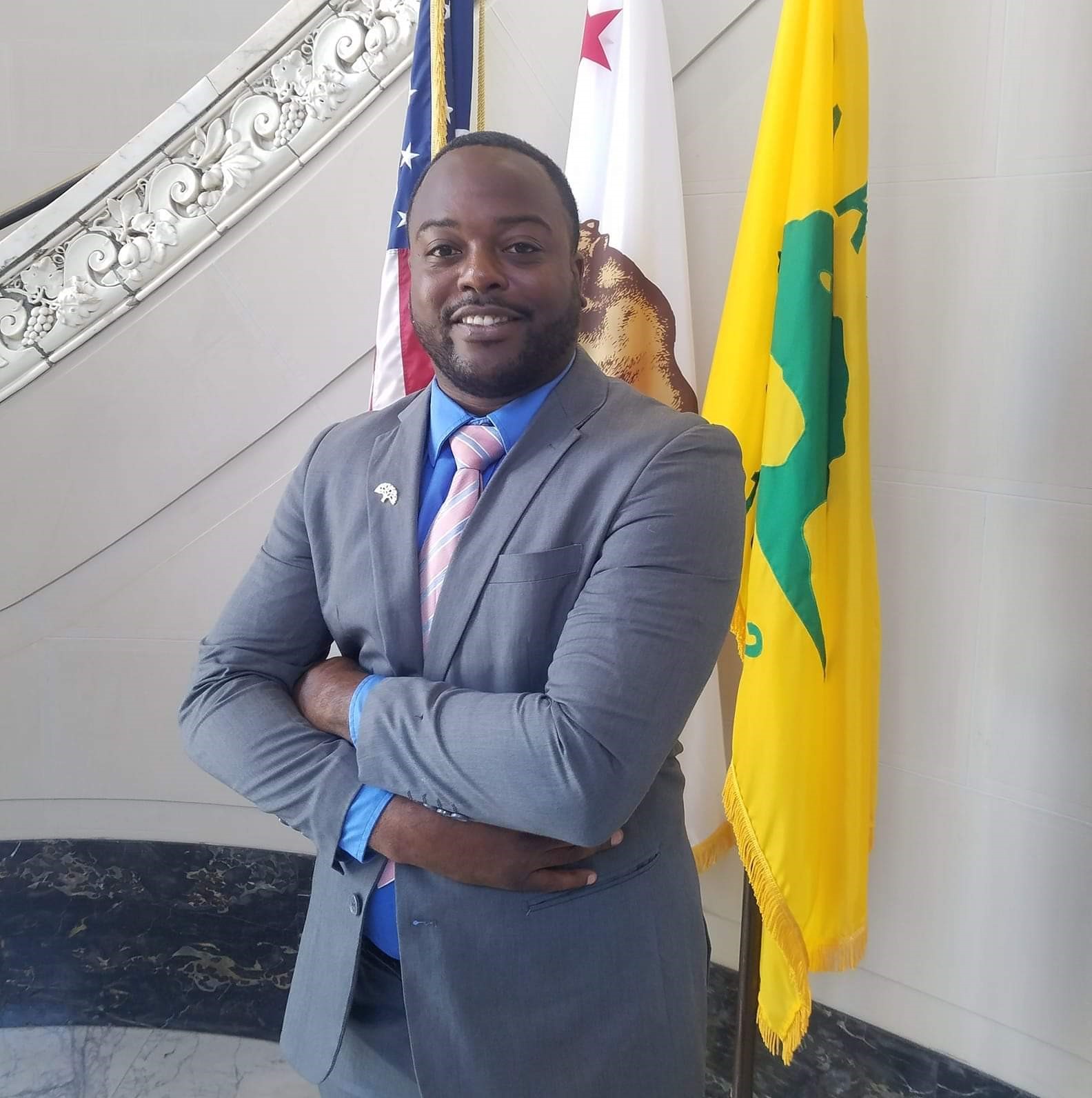
Hello everyone my name is Marchon Tatmon, Government Affairs Manager representing the San Francisco-Marin Food Bank. I just want to start off by saying thank you for all your hard work. We really appreciate everything that you have done, especially advocating for people who experience poverty and injustices that aren’t their fault. I really appreciate that. Let me touch some of the issues like investing in school meals for all, rejecting the governor’s supplemental security income cut that would harm over 100,000 children. Also, supporting AB 3073, one of Buffy Wicks’ bills, and supporting SB 882.
So just a brief overview of everything, before I start breaking them down. All of these connect to child poverty. I’m not sure if a lot of people realize, but in the communities of color, there are a lot of families that are going through these issues. Something else you guys probably don’t realize is that a lot of youth are staying with grandparents. I threw that out there because it’s something that’s really important to take into account for the SSI benefit and supporting Weiner SB 882, which is geared towards our older community. So, starting with the investment in school meals, hungry students struggle to learn. Research and common sense tells us that children must be well nourished in order to learn, grow, and achieve at their full potential. No children should go hungry in California public schools. More than 60% of California K-12 students qualify for free or reduced priced meals. This number will grow as we enter a deep recession, especially following COVID-19. Pandemic EBT, which launched in May, are not intended to replace meals from school but supply emergency assistance for all school aged children K-12, that usually receive school lunch but can’t because the school has been closed. Expanding the reach of school meals through the community eligibility provision will give more children access to free nutritious meals in the wake of COVID-19, as families grapple with unemployment, lost wages, and other hardships. Many California families are being left out of the federal stimulus action. Among those are certain immigrant families, and their citizen children, this is known as mixed families. They will not receive payments despite the grave need. So we need to increase access to school meals, meaning provide children with much needed food, regardless of immigration status.
The SSI grants were never restored, despite a decade of economic recovery. SSP investments have a significant economic multiplier. For every 10 million in increased state supplemental payments, that will support 15 million economic output, 93 jobs, and .9 million in state and local tax revenue. People on SSI are one of the most impacted populations in a healthcare crisis. They are at high risk to get sick from COVID-19. So this is increasing the already present inequities.
Another one is supporting AB 3073, which is a Buffy Wicks bill, it is a good bill. This is making sure that eligible people leaving jail or prison are able to receive CalFresh. We have to remember that a lot of these people leaving incarceration are going home to families. Research shows that people are more likely to be rehabilitated and reintegrated into their communities following incarceration if they are connected to basic needs, safety net programs, especially CalFresh. Hunger, like incarceration, disproportionately impacts communities of color. It’s the legacy of racist government policy. Federal funds are available now for low-income community members who need it in. California should do more to connect people who need it during re-entry.
The next one is Wiener bill, SB 882, which will simplify the CalFresh application and reporting process. COVID-19 pandemic additions are increasing the already high numbers of Californians experiencing food insecurity. This is placing low-income older adults and people with disabilities at increased risk. As I alluded to earlier, a lot of school age children in communities of color stay with grandparents. My grandma raised a few of my cousins, and I have a lot of family and friends whose grandparents raised them. So there are children in those households. As a proven positive public health invention, and powerful economic stabilizer, CalFresh has a critical role to play in California’s immediate and long-term COVID-19 response. Yet, only 19% of eligible Californians, people over 60, receive CalFresh. This is the lowest participation rate of any state. CalFresh has proven to help when it comes to providing food and helping people fight poverty. As the number of CalFresh applications are surging, due to the economic downturn and spike in unemployment, now is the time to make permanent improvement to ease access to CalFresh.
–Marchon Tatmon, Government Affairs Manager, San Francisco-Marin Food Bank
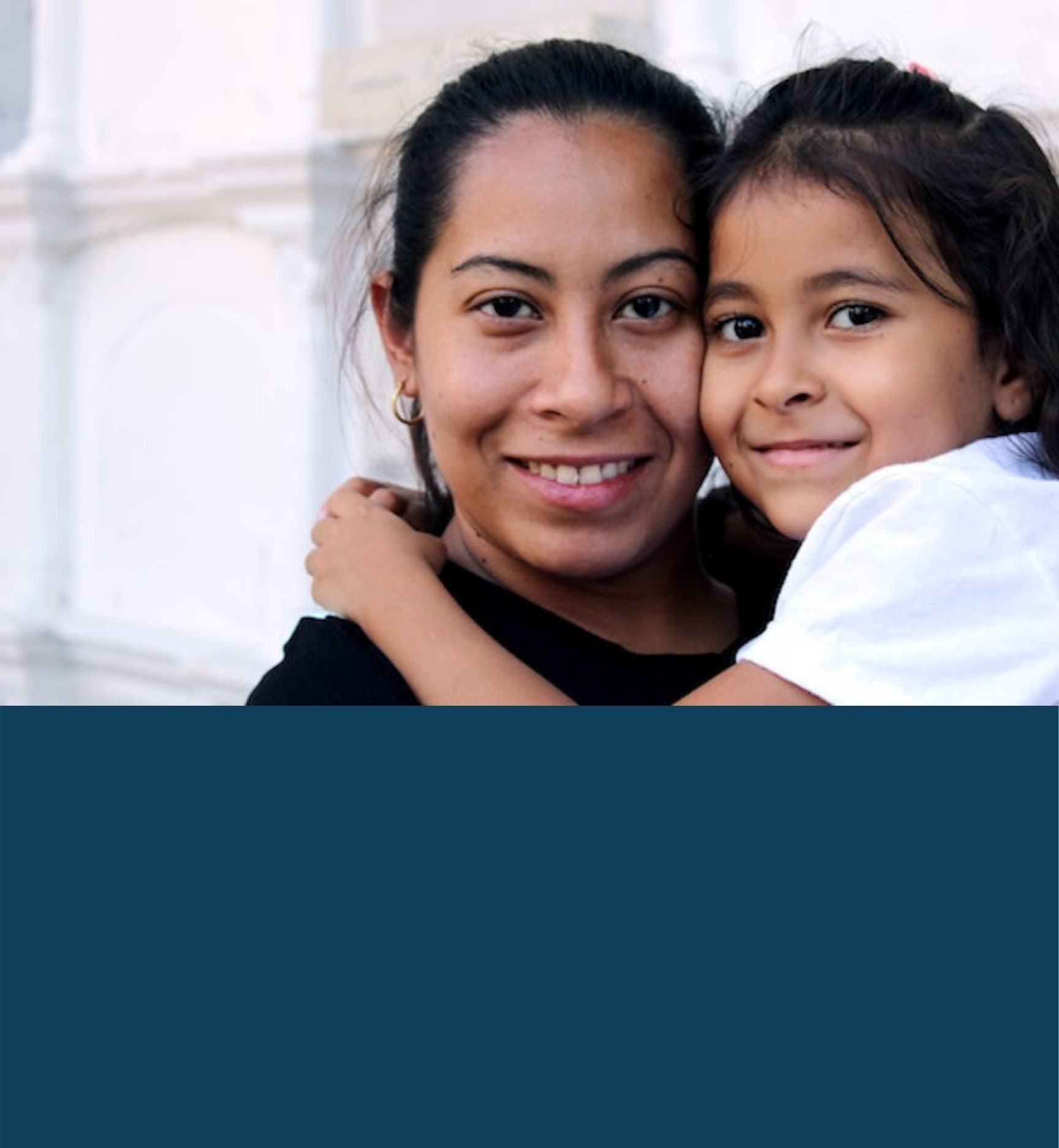
As a registered nurse at Kaiser Permanente, Melissa Villegas is accustomed to solving problems, but COVID-19 brought her face-to-face with a challenge she couldn’t face alone – child care.
With her 11-year-old son’s school closed and family friends no longer able to care for her 18-month-old daughter, Melissa made the difficult decision to go on unpaid leave from the hospital until she could find and pay for child care for her children. That ended up lasting the entire month of April.
“My schedule changes every week,” she explained. “Not many providers were able to accommodate an inconsistent schedule.”
And even if she had been able to find care that met the demanding health care worker’s schedule, there was the not-so-small matter of paying child care – which can cost San Diego residents as much as $16,000 per year for full-time infant care.
Melissa’s experience isn’t unique – working parents, particularly mothers, across the country make the difficult decision to sacrifice their work until they can find reliable care for their children. And when COVID-19 hit, the crisis became more urgent as essential workers needed child care to continue protecting our community.
The urgency for child care during COVID-19 made its way all the way to the State capital, and on April 10, Governor Newsom directed $50 million in state funds for limited-term child care vouchers for essential workers and at-risk populations.
Melissa jumped at the chance and worked with a YMCA Childcare Resource Service consultant who helped her navigate her options and find the provider that fit her needs. Within seven days of applying for funding, she was dropping her kids off at a family child care home near her house and on her way to work.
“If I didn’t have this child care, I probably would have cut my hours,” she said. “I would’ve had to take a pay cut.”
Instead, Melissa is back at Kaiser Permanente, helping her colleagues on the front lines of a global health crisis.
“I drop off my kids around 5 a.m., and I’ll usually pick them up around 8 p.m.,” she said.
At nearly 80 years old, Joy Mclaurin may not be what you would expect of a child care provider. But talk to her for even one minute, and you realize she would never spend her days another way.
“I’d already retired, but I wasn’t ready to give up,” she said. “It’s such a reward to see the children grow up. You plant seeds in them.”
Ms. Joy, as she’s affectionately known to the families and child care providers who know her, has been operating Joy’s Home Daycare in Oceanside for 25 years – but nothing could have prepared her for this public health crisis.
When San Diego County schools shuttered in response to COVID-19, parents designated as essential workers by the State of California rushed to find child care facilities that could care for their children while they continued to go to work.
At the same time, child care providers pivoted quickly to follow new and evolving public health practices so they could continue to operate their facilities and provide an essential service in its own right.
Recognizing the unique pressure the first days of the crisis put on so many San Diego residents, San Diego for Every Child quickly launched the San Diego COVID-19 Children’s Fund. The fund provides micro-grants for eligible families to buy groceries, diapers, and child care services, and for child care providers needing financial assistance to pay for hygiene supplies and wages.
Through Jewish Family Service of San Diego, the fund is still accepting donations from the community to build on $500,000 in seed funding from Sara Jacobs and $100,000 from The San Diego Foundation’s COVID-19 Community Response Fund. To date, YMCA Childcare Resource Service and Child Development Associates have distributed more than $700,000 in funds to families and child care providers.
Ms. Joy was one of hundreds of child care providers who applied for funds, and she used her $100 micro-grant to buy food for the nutritious meals she cooks for the children and cleaning supplies to make sure her already-spotless facility adheres to public health guidelines.
Currently, Ms. Joy cares for three girls, the latest in a cohort of individuals whose lives have been impacted by Ms. Joy’s vocation. She is still in touch with many of her alumni, including one who went on to become an engineer in Missouri, and knows that her time with them is part of the recipe for success.
“This is not babysitting; it’s not TV and a nap,” she stressed. “This is home daycare with a learning and loving environment. I teach them their shapes, colors, and cutting with scissors just like they do in preschool.”
Ms. Joy’s passion for early childhood education is not unique. San Diego County has more than 3,500 licensed family child care homes, licensed child care businesses that operate out of homes and care for a mixed-age group of children in a family-like setting. In comparison, there are 979 licensed child care centers that provide care in a classroom-like setting.
In spite of their dedication, many of these family child care providers face significant challenges in running their businesses. Locally, the cost of operating a family child care home is nearly double the amount families can afford, so providers often prioritize the needs of their clients and will not increase prices even if it jeopardizes their own financial stability. As a result, the average take-home pay of a California family child care provider is just $9.76/hour, per the Center for the Study of Child Care Employment. This figure is nearly $3 below California’s $12.00 minimum wage, and well below the living wage threshold for a single adult with one child.
Though child care providers play a crucial role in the development of young children, they are compensated significantly less than formal educators of school-age children. This amplifies the discussion about our society’s values and the price we put on caring for children during their most important years of brain development.
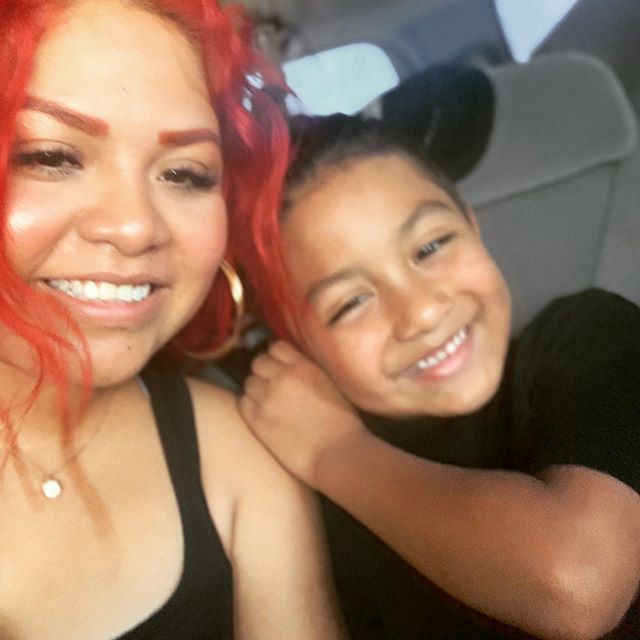
My name is Adriana Aguilar. I came to America 10 years ago as an immigrant, and today I still am. For the years that I’ve lived in America, the year 2020 has been one of the toughest years. As an immigrant it’s hard to get a job because of our legal status. With this pandemic it makes it even harder to find a job because everything is closing, and even citizens are losing their jobs. I’m a single mother of a 7 year old so I have to have a job to provide for food, bills, and rent expenses. As an immigrant we don’t get access to benefits. It’s been a pretty tough year, even my mom was without a job. She’s also an immigrant, and is stressed and worried about how to bring food and provide money for our expenses when we don’t have any help.
I really wish that there was a way to help the immigrant communities with food and other help. There’s other immigrants that are in a worse situation than me. There’s children and seniors who are struggling. I’m blessed to have food at home. There’s good people and friends that help us out, but not all immigrants have the same luck. When you walk on the street you will see people without homes. Even me and my mom have a few friends that had to move out of their places due to not having money to pay rent, and not having a job because of COVID-19. If the immigrant communities got emergency help it would help them out a lot of. It would keep immigrants from starving. It would keep them from not having to stay at a friend’s house, or even ending up without a home.
My hope is to see my people eat, stay strong, and to win this pandemic.
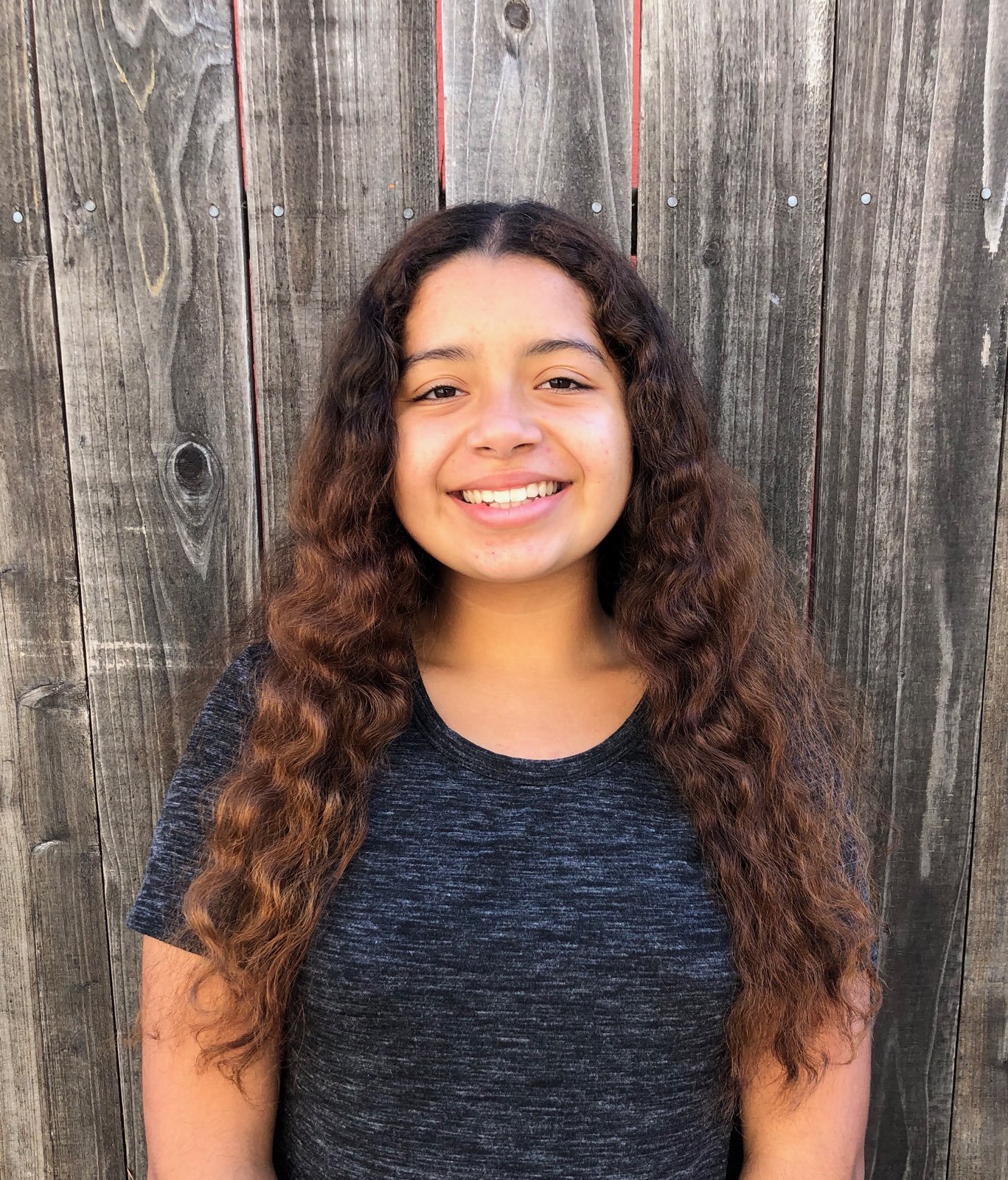
My name is Karen Rojas. I am a student at Nea Community Learning Center in Alameda, California. I am a student leader at the Martin Luther King Jr. Freedom Center.
I am speaking today to ask that you pass Senate Bill 1409 that will greatly help low-income families like mine.
I am 16 years old, and I have been raised by two wonderful sheroes, my grandmother and mother. My grandmother works at a minimum wage job, without benefits, for a large retail chain. Throughout her life she has had unstable housing. My mother is a single parent and she works very hard to support me.
Many other families in my community face daily struggles like we do. Many other students at the Martin Luther King Jr Freedom Center are in low-income families that often have a hard time paying for food, rent and utilities. Some of my colleagues have experienced being homeless.
Depending on the number of children in a home, California’s Earned Income Tax Credit delivers between $223 to $2,775, but many people may not know that they qualify for the credit, or how to file for it.
The study required under this bill would help increase the number of eligible individuals and families that receive the EITC. As you know, SB 1409 requires the franchise tax board to explore how to make tax filing less burdensome for low-income households like mine that would be eligible, but do not currently file a tax return to claim the credit.
The purpose of the study is to evaluate workability and practicability. And, more importantly to inform whether such a program beneficially serves California’s residents. SB 1409 passage into law will allow the state to evaluate how the EITC could be made available to eligible Californians who do not currently benefit from the credit.
We ask that you approve SB 1409 because some of our lowest income hard working families who would benefit the most from the EITC, may be missing money they desperately need. Even the amount of $223 from the Tax Credit would be very helpful for people and families who have challenges simply feeding themselves.
